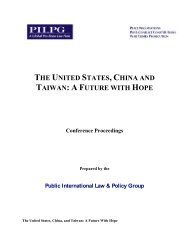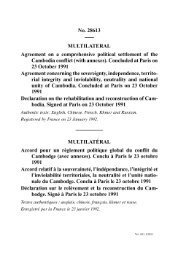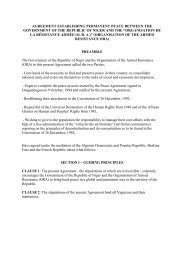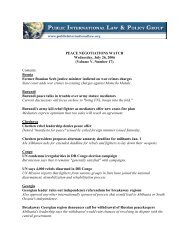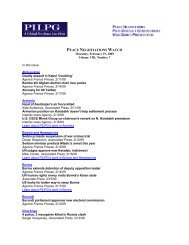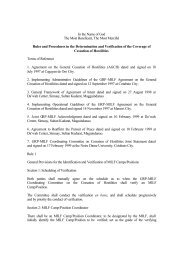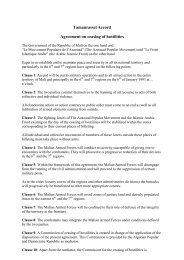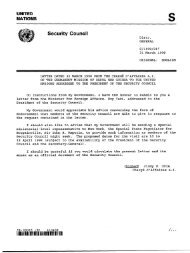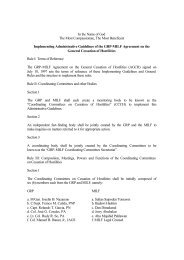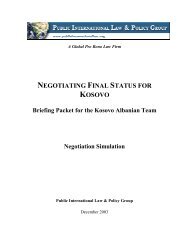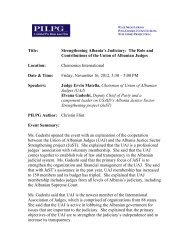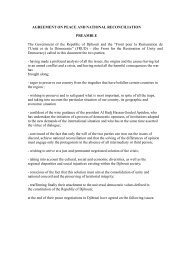Create successful ePaper yourself
Turn your PDF publications into a flip-book with our unique Google optimized e-Paper software.
15<br />
of violent incidents against Kosovo Serbs and some improvement in providing basic<br />
living services, in part through the operation of the local community offices established<br />
by the UN in Serb enclaves. Violence remains a problem, however, as seen by the<br />
murder of a Serb near Lipljan toward the end of February.<br />
The basic picture for Serbs in Kosovo remains as it has been since the end of the 1999<br />
war. In the Albanian-dominated southern part of Kosovo, Serbs live in isolated enclaves<br />
or in small groups, where they are dependant on the international mission for security,<br />
movement outside the enclaves, and provision of most basic human services. In the<br />
north, beyond the Ibar divide, Serbs are completely separated from the rest of Kosovo,<br />
living for most purposes in an extension of Serbia.<br />
Serbs throughout Kosovo continue to look to Belgrade for direction. Most Kosovo Serb<br />
political leaders reach back to Belgrade for support from one or another of the leading<br />
figures in the ruling DOS coalition. Sympathy for Milosevic's Socialist Party of Serbia<br />
(SPS) was also said to remain strong.<br />
Data on the number of Serbs remaining in Kosovo is scanty. Despite intensive<br />
international efforts to create conditions for the return of Serbs and a few well-publicized<br />
incidents of return, it is apparent that the Serbs of Kosovo are a declining community.<br />
Attitudes toward politics and the future differ widely between Serbs in the enclaves and<br />
Serbs in the north. In the enclaves Serbs recognize that their future depends on some<br />
form of cooperation with the international community. Serbs in the north feel themselves<br />
essentially to be part of Serbia and want little to do with the international community.<br />
Serbs in the south continue to dream that Kosovo will return to some form of association<br />
with Belgrade although they probably recognize that Albanians will play a dominant role<br />
in Kosovo whatever its future status is. Serbs in the north, by contrast, are increasingly<br />
openly laying the ground for partition. One thing unites Serbs throughout Kosovo—<br />
continued unwillingness to consider independence for Kosovo.<br />
Undoubtedly the most positive development involving Kosovo Serbs was the decision of<br />
the coalition "Povratak" to participate in the 2002 elections and to take their seats in the<br />
Kosovo Assembly. (The word "povratak" means "return" in Serbo-Croatian and its<br />
message is a dual one. Ostensibly it refers to the desired return to Kosovo of Serb<br />
refugees; subliminally, it is also understood to convey what Albanians would regard as<br />
the threat of Belgrade's return to rule.) After prolonged negotiations between Belgrade<br />
and UNMIK chief Haekkerup, FRY President Vojislav Kostunica shortly before the<br />
autumn parliamentary elections in Kolsovo gave a grudging blessing to the participation<br />
of Kosovo Serbs, both those in Kosovo and refugees living in the FRY.<br />
The results were that over 89,000 Serbs voted for Povratak, the only Serb party on the<br />
ballot. There were, however, clear divisions within the Kosovo Serb community on the<br />
issue. In the Serb-dominated northern portion of Kosovo there were many instances of<br />
intimidation of voters, with a result that participation there was lower than in Serb<br />
enclaves in the south.



